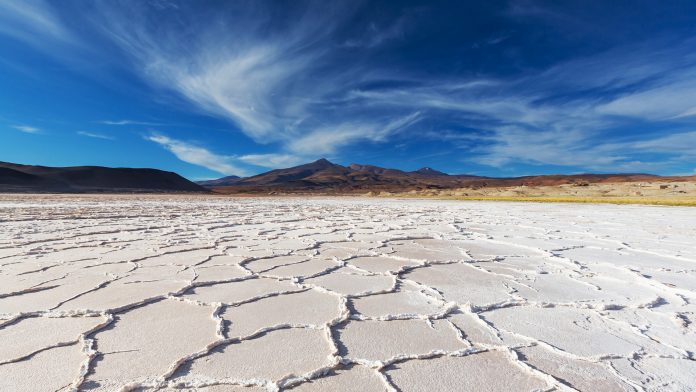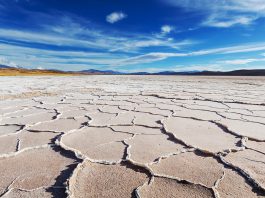Much of the Rincon Salar is controlled by Rio Tinto, with advances also from the two additional concession holders, Argosy Minerals and Argentina Lithium.
In terms of expanding global production of lithium, Argentina is one key area to watch. It is the world’s fastest growing lithium producing country, according to Mining.com’s article on lithium production dated 23 May this year.
In 2022, the country was the world’s fourth-highest producer, with approximately 40,000 tonnes of LCE or lithium carbonate equivalent production.
According to Argentina’s President of the Chamber of Mining Business, Franco Mignacco, the country is targeting a threefold increase to approximately 120,000 tonnes LCE in 2025 (Reuters, 24 April, ‘Argentina’s lithium pipeline’).
Argentina is thriving in the lithium sector with a decentralised, pro-market strategy. It has been granting concessions for the last ten years.
Today, the country has two producing companies, a third starting this summer, six lithium projects under construction, and 15 in the advanced exploration or feasibility stage.
By way of contrast, the same article notes that Chile, the world’s second-largest producer, has very few new projects. Rather, negotiations surround the possible ways in which the Chilean Government might capture a greater percentage of the revenue.
In Bolivia – the third country in the prolific Lithium Triangle – production has “repeatedly stalled as a result of excessive state control,” stated the Wilson Center’s Benjamin Gedan, Director of their Latin America program.
The government only recently okayed a new project by a Chinese group.
Free trade agreement with the US said to be pending
Importantly, Argentina has been lobbying to get in on the EV drive in the US.
Landmark climate legislation, called the Inflation Reduction Act, features tax credits for electric vehicles purchased in the US that have a portion of their battery metals sourced in the US or a free-trade-agreement (FTA) country.
Australia and Chile, the top two lithium suppliers, have FTAs with the US. Argentina does not.

However, it is close to achieving this status, according to Fernanda Avila, the Argentine mining undersecretary, as reported by Bloomberg on 23 April and reprinted in mining.com.
Where are expanding lithium projects in Argentina?
In terms of lithium expansion, two of the most important areas to watch are the Rincon salar and Antofalla salar (salt flats) in the Andes in far northwestern Argentina.
We focus this article on the Rincon salar. Here, Rio Tinto PLC (RIO.L, RIO.NYSE) is targeting initial small-scale production starting in 2024.
The other companies at Rincon are also progressing.
Argosy Minerals (AGY.ASE) is anticipated to become one of the next companies to start delivery of lithium carbonate to the EV market starting later this year or early in 2024.
Argentina Lithium and Energy (LIT.V, PNXLF.OTC) holds large exploration positions at Rincon and is operated by a qualified discovery-focused management and geological team.
The company has completed and reported results from its initial drill campaign of nine holes at the Rincon West Project.
Rincon salar: A standout basin with two projects initiating production near-term
Argosy Minerals announced on 1 May this year that it has produced 13.5 tonnes of battery-grade lithium carbonate with average quality of 99.79% from small-batch operations on-site at the Rincon salar.
The company is targeting steady-state, continuous operations by the end of June.
By achieving production and sales of lithium carbonate at the rate of 2,000 tonnes/year, Argosy is targeting earning the capital to increase production to 10,000 tonnes/year.
The company is advancing formal progress with strategic arrangements for off-take and capital funding for the 10,000 t/year level.
Rio Tinto has big plans at the Rincon salar
Rio Tinto, the world’s second-largest mining company by market capitalisation, acquired most of the Rincon salar in March 2021 from Rincon Mining for $825m. The company has been very active at the salar since making the acquisition.
According to miningweekly.com, Rio Tinto has constructed and is operating a pilot plant on-site. It is aggressively drilling to expand the resource and has started construction of a 3,000-tonne/year starter plant to produce lithium carbonate commencing in 2024. Its plan is to have the starter plant serve as a pilot for a much larger, 50,000-tonne/year plant there.
Rio Tinto also announced last year that it had signed a Memorandum of Understanding with Ford Motor Company for delivery of lithium carbonate from the Rincon salar.
Argentina Lithium’s discovery at the Rincon salar
Argentina Lithium controls 3,742 hectares at the Rincon salar, or the equivalent of 6km by 6km, lying adjacent on the west side of the Rio Tinto concessions. This includes an additional parcel of approximately 850 hectares that is adjacent to the north of Rio Tinto. This is also believed to be prospective.
Early in 2022, the company applied geophysical imaging at Rincon West and confirmed the potential for lithium brines under two-thirds of the initial property area. A diamond drill was mobilised to site in May 2022, and has been operating continuously until recently.
The company has now completed and reported the assays from all holes of an initial nine-hole exploration program.
All holes completed at Rincon West have sampled lithium-enriched brines. Drilling to date has focused on the central part of the property where excellent brine grades, similar to those reported for the Rio Tinto resource (Montgomery & Associates, July 26, 2021, the last resource estimate before Rio’s acquisition), have been returned over broad intervals in the majority of holes.
Management at Argentina Lithium has advantages
Argentina Lithium has a distinct advantage over other explorers in Argentina. The company is a member of the Grosso Group, which has been actively exploring in Argentina for 30 years, since mineral exploration started there in 1993.
Companies managed by the Grosso Group share operational resources, providing outsized ability to acquire and manage projects by deploying an expert team.
The Grosso Group has been involved in four major mineral discoveries in Argentina thus far.
CEO Niko Cacos and VP-Exploration Miles Rideout are unrelenting in the pursuit of additional discoveries.
Mr Cacos brings more than 30 years of executive level management and advisory expertise in the mineral exploration industry. He has worked with Grosso Group since inception and serves as a senior level executive for all the member companies. He holds a Master of International Management degree from Heidelberg, Germany and a Bachelor of Science degree from the University of British Columbia.
Mr Rideout has 34 years of experience in advanced exploration practice, responsible business management, scientific team building, and mining integration with local communities and Indigenous peoples.
In recent positions, Mr Rideout has directly managed the acquisition and exploration of dozens of lithium properties in northern Argentina. He participated in the discovery of several world-class deposits, including the Collahuasi and Ujina copper-porphyry deposits, Veladero epithermal gold deposit, and Navidad VMS/epithermal silver deposit.
Mr Rideout holds a BSc with Honors Certificate in Geophysics from the University of Western Ontario (1987). Fluent in English and Spanish, he has lived in Mendoza, Argentina, for more than 20 years.
Please note that proximity to other mining projects does not provide any assurance with respect to making similar discoveries.
Argentina Lithium, with professional outside consultants, has begun the modelling work for a potential resource calculation for this first area based on these positive results.
Additionally, the company is scheduled to begin drilling five holes on the adjacent Rinconcita II block on the east side of Rincon West shortly.
The company will then move its exploration focus to the company’s third property in the Rincon salar, the Paso de Sico block lying to the north of Rio Tinto.
The Antofalla salar has great potential
The Antofalla Salar, 120 km south of Rincon, is also coming on strong.
The central area of the Antofalla salar is controlled by Albemarle Corp., the world’s second-largest lithium producer.
Albemarle stated in its news release dated 12 September 2016: “Albemarle believes that this lithium resource (the company’s concession at the Antofalla salar) will be certified as the largest lithium resource in Argentina.”
Here, Argentina Lithium controls the Antofalla North property group, covering the basin adjoining Albemarle on the north side. It measures 10,050 hectares, equivalent to 10 km by 10 km – a very substantial area.
Applications for exploration permits have been filed and are pending.
The EV revolution expands in Argentina
The Rincon salar in Argentina in the Lithium Triangle is a key area to watch, with modest initial production by two companies expected next year – possibly starting late this year – and expanding for many years to come.









